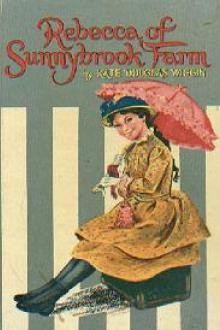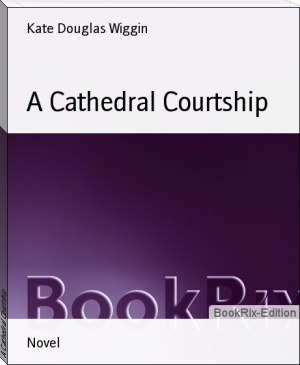Rebecca of Sunnybrook Farm, Kate Douglas Wiggin [primary phonics .TXT] 📗

- Author: Kate Douglas Wiggin
- Performer: -
Book online «Rebecca of Sunnybrook Farm, Kate Douglas Wiggin [primary phonics .TXT] 📗». Author Kate Douglas Wiggin
Then, when all was ready and Abijah Flagg at the door, came a telegram from Hannah: “Come at once. Mother has had bad accident.”
In less than an hour Rebecca was started on her way to Sunnybrook, her heart palpitating with fear as to what might be awaiting her at her journey’s end.
Death, at all events, was not there to meet her; but something that looked at first only too much like it. Her mother had been standing on the haymow superintending some changes in the barn, had been seized with giddiness, they thought, and slipped. The right knee was fractured and the back strained and hurt, but she was conscious and in no immediate danger, so Rebecca wrote, when she had a moment to send aunt Jane the particulars.
“I don’ know how ‘tis,” grumbled Miranda, who was not able to sit up that day; “but from a child I could never lay abed without Aurelia’s gettin’ sick too. I don’ know ‘s she could help fallin’, though it ain’t anyplace for a woman,—a haymow; but if it hadn’t been that, ‘t would ‘a’ been somethin’ else. Aurelia was born unfortunate. Now she’ll probably be a cripple, and Rebecca’ll have to nurse her instead of earning a good income somewheres else.”
“Her first duty ‘s to her mother,” said aunt Jane; “I hope she’ll always remember that.”
“Nobody remembers anything they’d ought to, —at seventeen,” responded Miranda. “Now that I’m strong again, there’s things I want to consider with you, Jane, things that are on my mind night and day. We’ve talked ‘em over before; now we’ll settle ‘em. When I’m laid away, do you want to take Aurelia and the children down here to the brick house? There’s an awful passel of ‘em,—Aurelia, Jenny, and Fanny; but I won’t have Mark. Hannah can take him; I won’t have a great boy stompin’ out the carpets and ruinin’ the furniture, though I know when I’m dead I can’t hinder ye, if you make up your mind to do anything.”
“I shouldn’t like to go against your feelings, especially in laying out your money, Miranda,” said Jane.
“Don’t tell Rebecca I’ve willed her the brick house. She won’t git it till I’m gone, and I want to take my time ‘bout dyin’ and not be hurried off by them that’s goin’ to profit by it; nor I don’t want to be thanked, neither. I s’pose she’ll use the front stairs as common as the back and like as not have water brought into the kitchen, but mebbe when I’ve been dead a few years I shan’t mind. She sets such store by you, she’ll want you to have your home here as long’s you live, but anyway I’ve wrote it down that way; though Lawyer Burns’s wills don’t hold more’n half the time. He’s cheaper, but I guess it comes out jest the same in the end. I wan’t goin’ to have the fust man Rebecca picks up for a husband turnin’ you ou’doors.”
There was a long pause, during which Jane knit silently, wiping the tears from her eyes from time to time, as she looked at the pitiful figure lying weakly on the pillows. Suddenly Miranda said slowly and feebly:—
“I don’ know after all but you might as well take Mark; I s’pose there’s tame boys as well as wild ones. There ain’t a mite o’ sense in havin’ so many children, but it’s a turrible risk splittin’ up families and farmin’ ‘em out here ‘n’ there; they’d never come to no good, an’ everybody would keep rememberin’ their mother was a Sawyer. Now if you’ll draw down the curtin, I’ll try to sleep.”
XXIX MOTHER AND DAUGHTERTwo months had gone by,—two months of steady, fagging work; of cooking, washing, ironing; of mending and caring for the three children, although Jenny was fast becoming a notable little housewife, quick, ready, and capable. They were months in which there had been many a weary night of watching by Aurelia’s bedside; of soothing and bandaging and rubbing; of reading and nursing, even of feeding and bathing. The ceaseless care was growing less now, and the family breathed more freely, for the mother’s sigh of pain no longer came from the stifling bedroom, where, during a hot and humid August, Aurelia had lain, suffering with every breath she drew. There would be no question of walking for many a month to come, but blessings seemed to multiply when the blinds could be opened and the bed drawn near the window; when mother, with pillows behind her, could at least sit and watch the work going on, could smile at the past agony and forget the weary hours that had led to her present comparative ease and comfort.
No girl of seventeen can pass through such an ordeal and come out unchanged; no girl of Rebecca’s temperament could go through it without some inward repining and rebellion. She was doing tasks in which she could not be fully happy,—heavy and trying tasks, which perhaps she could never do with complete success or satisfaction; and like promise of nectar to thirsty lips was the vision of joys she had had to put aside for the performance of dull daily duty. How brief, how fleeting, had been those splendid visions when the universe seemed open for her young strength to battle and triumph in! How soon they had faded into the light of common day! At first, sympathy and grief were so keen she thought of nothing but her mother’s pain. No consciousness of self interposed between her and her filial service; then, as the weeks passed, little blighted hopes began to stir and ache in her breast; defeated ambitions raised their heads as if to sting her; unattainable delights teased her by their very nearness; by the narrow line of separation that lay between her and their realization. It is easy, for the moment, to tread the narrow way, looking neither to the right nor left, upborne by the sense of right doing; but that first joy of self-denial, the joy that is like fire in the blood, dies away; the path seems drearier and the footsteps falter. Such a time came to Rebecca, and her bright spirit flagged when the letter was received saying that her position in Augusta had been filled. There was a mutinous leap of the heart then, a beating of wings against the door of the cage, a longing for the freedom of the big world outside. It was the stirring of the powers within her, though she called it by no such grand name. She felt as if the wind of destiny were blowing her flame hither and thither, burning, consuming her, but kindling nothing. All this meant one stormy night in her little room at Sunnybrook, but the clouds blew over, the sun shone again, a rainbow stretched across the sky, while “hope clad in April green” smiled into her upturned face and beckoned her on, saying:—
“Grow old along with me, The best is yet to be.”
Threads of joy ran in and out of the gray tangled web of daily living. There was the attempt at odd moments to make the bare little house less bare by bringing in out-of-doors, taking a leaf from Nature’s book and noting how she conceals ugliness wherever she finds it. Then there was the satisfaction of being mistress of the poor domain; of planning, governing, deciding; of bringing order out of chaos; of implanting gayety in the place of inert resignation to the inevitable. Another element of comfort was the children’s love, for they turned to her as flowers to the sun, drawing confidently on her fund of stories, serene in the conviction that there was no limit to Rebecca’s power of make-believe. In this, and in yet greater things, little as she realized it, the law of compensation was working in her behalf, for in those anxious days mother and daughter found and knew each other as never before. A new sense was born in Rebecca as she hung over her mother’s bed of pain and unrest,—a sense that comes only of ministering, a sense that grows only when the strong bend toward the weak. As for Aurelia, words could never have expressed her dumb happiness when the real revelation of motherhood was vouchsafed her. In all the earlier years when her babies were young, carking cares and anxieties darkened the fireside with their brooding wings. Then Rebecca had gone away, and in the long months of absence her mind and soul had grown out of her mother’s knowledge, so that now, when Aurelia had time and strength to study her child, she was like some enchanting changeling. Aurelia and Hannah had gone on in the dull round and the common task, growing duller and duller; but now, on a certain stage of life’s journey, who should appear but this bewildering being, who gave wings to thoughts that had only crept before; who brought color and grace and harmony into the dun brown texture of existence.
You might harness Rebecca to the heaviest plough, and while she had youth on her side, she would always remember the green earth under her feet and the blue sky over her head. Her physical eye saw the cake she was stirring and the loaf she was kneading; her physical ear heard the kitchen fire crackling and the teakettle singing, but ever and anon her fancy mounted on pinions, rested itself, renewed its strength in the upper air. The bare little farmhouse was a fixed fact, but she had many a palace into which she now and then withdrew; palaces peopled with stirring and gallant figures belonging to the world of romance; palaces not without their heavenly apparitions too, breathing celestial counsel. Every time she retired to her citadel of dreams she came forth radiant and refreshed, as one who has seen the evening star, or heard sweet music, or smelled the rose of joy.
Aurelia could have understood the feeling of a narrow-minded and conventional hen who has brought a strange, intrepid duckling into the world; but her situation was still more wonderful, for she could only compare her sensations to those of some quiet brown Dorking who has brooded an ordinary egg and hatched a bird of paradise. Such an idea had crossed her mind more than once during the past fortnight, and it flashed to and fro this mellow October morning when Rebecca came into the room with her arms full of goldenrod and flaming autumn leaves.
“Just a hint of the fall styles, mother,” she said, slipping the stem of a gorgeous red and yellow sapling between the mattress and the foot of the bed. “This was leaning over the pool, and I was afraid it would be vain if I left it there too long looking at its beautiful reflection, so I took it away from danger; isn’t it wonderful? How I wish I could carry one to poor aunt Miranda to-day! There’s never a flower in the brick house when I’m away.”
It was a marvelous morning. The sun had climbed into a world that held in remembrance only a succession of golden days and starlit nights. The air was fragrant with ripening fruit, and there was a mad little bird on a tree outside the door nearly bursting his throat with joy of living. He had forgotten that summer was over, that winter must ever





Comments (0)